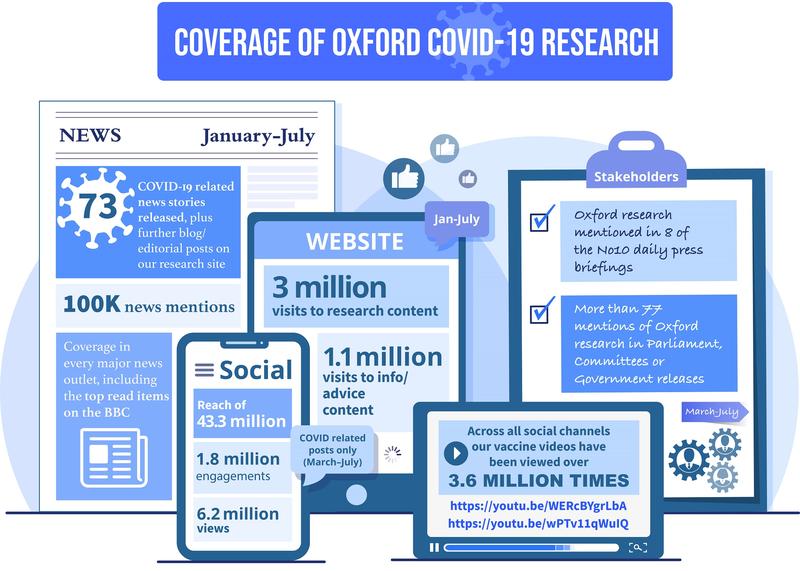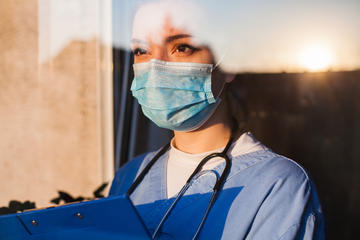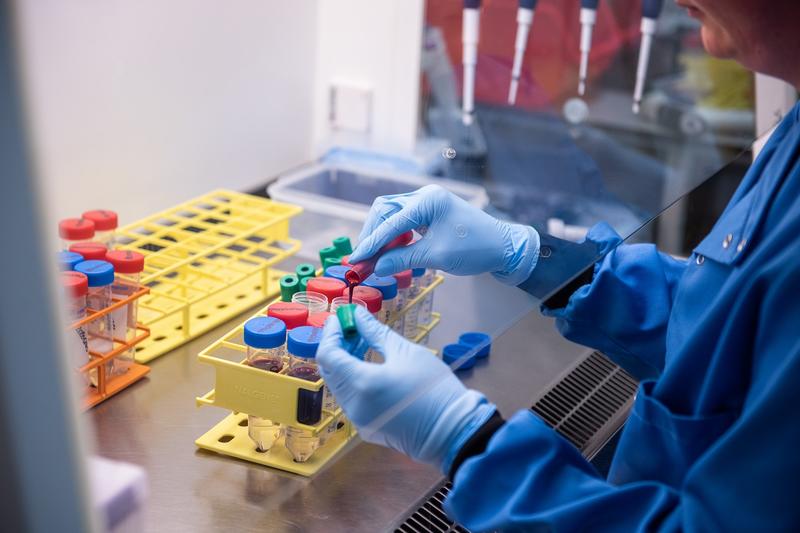Oxford’s rapid response to COVID-19
An overview of just some of the ways that Oxford is contributing to the solution

News coverage of Oxford's COVID-19 research
The COVID-19 pandemic is one of the greatest challenges of our time and research and innovation will be key elements in successfully mitigating and eventually overcoming themany difficulties we now face.
As researchers around the world work at unprecedented speed to understand the virus and its impact, to identify drug treatments and to develop a vaccine, the University’s donors, network of partnerships and flexible research infrastructure have been crucial in enabling our researchers to play a leading role in the global response.

Patrick Grant
‘Researchers across the University have been quick and effective in their response to respond to COVID-19,’ says Professor Patrick Grant, Pro-Vice-Chancellor for Research.
‘Years of research into the underlying, basic science of infectious diseases has established a significant breadth and strength of research expertise. Combining this knowledge with our extensive network of global partners and world-class lab facilities gave us the opportunity to pivot rapidly to address the current crisis. However, it was absolutely critical to make targeted research funding available quickly, to back our research teams, while external research funding routes could be developed. For example, in the early stages of the University’s research response, our new Strategic Research Fund provided a guarantee of £1 million for vaccine manufacturing costs to avoid delay.’
COVID-19 Research Response Fund
Led by the incredibly fast and generous response of donors – from corporations to private philanthropists and through gifts large and small – we were also able to establish the COVID-19 Research Response Fund(CRRF) in April 2020.
Although the CRRF focused on speed, flexibility and making a difference to health outcomes as quickly as possible, it was also important that there were open calls to researchers for their ideas, and a peer-review of proposals.
‘It was amazing how senior research leaders, from across all divisions, gave up their time to review the many proposals we received, sometimes with proposals read overnight and then debated in the panel the next day in marathon Teams meetings over many hours. A responsive panel process was only possible because of the hard work and commitment of the tremendous CRRF support team put together by the Medical Sciences Division, and the outstanding work of the Development Office working with donors,’ Professor Patrick Grant continued.
Donors have generously pledged crucial funding to support the University’s COVID-19 research, including donations for specific programmes of work. Of this, over £8 million has been deployed through the CRRF, competitively awarding funding for near-term, urgent COVID-19 research. The CRRF proposal success rate was approximately 35%, and over 90 research projects have received funding.
Expansion of the containment facility for infectious viruses
One of the projects funded by the COVID-19 Research Response Fund is the expansion of the core virus containment facility, where work on infectious viruses like COVID-19 can be carried out safely. The expansion of the lab has allowed for the secure propagation of the virus for researchers across the University to study and test as part of a variety of antiviral and immunology research programmes. Numerous projects,such as work on the vaccine and COVID-19 antibodies, have benefitted from this resource.
Professor William James from the Sir William Dunn School of Pathology describes the impact the funding has had. ‘The Research Response Fund has helped the University to recommission the Sir William Dunn School of Pathology's containment level 3 facility to support Oxford’s COVID-19 research efforts.
'We gained certification from the UK Health and Safety Executive at Easter, and have trained 12 research workers to handle the virus safely and effectively in support of the vaccine and antiviral drug development programmes, as well as investigations into the immunology, virology and pathology of the disease.
These studies have already led to improvements in clinical service, identified powerful new agents with antiviral potential and made possible multiple scientific publications.
Exploring the emotional and psychological impacts of the pandemic
The flexible nature of the COVID-19 Research Response Fund has also allowed projects beyond medical

sciences to conduct essential researchon the emotional and psychological impacts of the pandemic. Professor Kate Saunders from the Department of Psychiatry swiftly launched a project examining how traumatic experiences from the pandemic may impact frontline NHS staff, and what interventions may be able to help them.
‘The COVID-19 pandemic has exposed NHS staff to a vastly increased frequency of traumatic events, such as witnessing patients die,’ explains Professor Saunders.
‘Some members of staff are experiencing high rates of post-traumatic stress symptoms, such as intrusive memories, or “flashbacks”, of the events they have seen. Our project is trialling a brief digital intervention developed by Dr Lalitha Lyadurai and Professor Emily Holmes which involves playing a computer game to reduce intrusive memories.’
The brief intervention has already been trialled face-to-face with other populations, for example people who have been involved in road traffic accidents.
‘We plan to adapt the intervention to an entirely digital format tailored for NHS staff,’ explains Professor Saunders. ‘We hope to see both immediate benefits for staff, including improved mental health symptoms and job performance, and longer-term impact on sickness absence.
‘The University's COVID-19 Research Response Fund has enabled us to develop the digital intervention and start a pilot randomised controlled trial, supporting our application to run a larger definitive trial. We hope this will lead towards implementation of this simple, scalable, digital intervention for healthcare staff (and other vulnerable groups) affected by the global impact of the COVID-19 pandemic.’
Rapid testing

Blood processing at the Jenner Institute
The Research Response Fund has also supported projects outside the Medical Sciences Division, allowing multi-disciplinary research combining expertise from a variety of departments to move forward. One such project is investigating rapid coronavirus testing, led by Professor Achilles Kapanidis from the University’s Department of Physics. Working together with colleagues from the Department of Engineering Science and the Medical Sciences Division, the group is developing faster, more accurate tests for COVID-19.
‘Rapid and sensitive viral testing is crucial for controlling the COVID-19 pandemic, helping to end lockdowns and resuming economic and social activities worldwide,’ says Professor Kapanidis. ‘However, current diagnosis relies on nucleic acid tests, which take up to several days to provide results and can be unreliable.
‘Working in collaboration with my colleague Dr Nicole Robb, we are developing COVID-19 diagnostics that provide results within five minutes without requiring tedious sample preparation or signal amplification. Instead, our test uses novel methods for rapid labelling and fluorescence imaging of single viral particles, followed by image analysis based on machine learning.
‘The test can also be used to identify other respiratory viruses, such as influenza, providing a promising avenue for rapid viral testing in the coming flu season.
‘The funds we’ve received from the University’s COVID-19 Research Response Fund have allowed us to lease a dedicated ultra-sensitive microscope for 6 months,’ continues Professor Kapanidis. ‘Using the microscope we have been able to examine clinical samples of many respiratory viruses, including SARS-CoV-2, the virus that causes COVID-19; without this dedicated microscope, the work on clinical samples, as well as the daily interaction with our clinical colleagues, would essentially have been impossible.’
Supporting Oxford’s life-saving work
Head of the Medical Sciences Division Professor Gavin Screaton emphasised the University’s appreciation and the importance of the COVID-19 Research Response Fund – and how it is supporting Oxford’s life-saving work.
‘Through the generous donations received and distributed via the fund, Oxford has been able to respond to COVID-19 with speed and agility, by supporting many high-impact projects that will really make a difference.
I would like to offer my utmost thanks to everyone who kindly donated or raised funds to support these research efforts.


